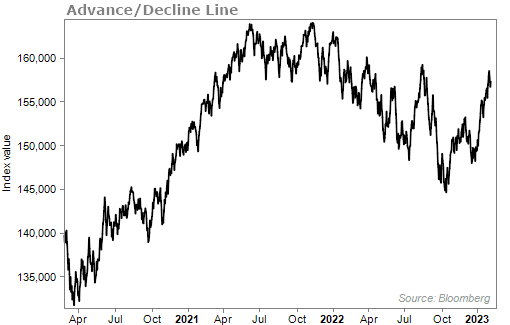One basic sign of market health is whether more stocks are going up or down.
The advance/decline line is a simple measure... You take the number of stocks listed on the New York Stock Exchange that went up in a given day and subtract the number that went down. If more went up that day, the line goes up. If more went down, the line goes down.
In a healthy market, as the market goes up, the advance/decline line rises with it. When the advance/decline line moves lower while the market continues to go up, it's time to worry. It means the gains are concentrated in only a few companies.
Toward the end of 2021, we saw the advance/decline line start to fall. It bottomed in October of last year. But since then, it has been heading higher.

This is a positive sign for the markets... It's telling us that we may be nearing the end of this bear market.
Longtime readers know we follow lots of economic and market indicators that we'll update you on throughout the year. And the advance/decline line is just one of the positive signs we're seeing.
Keep your eyes here as we continue to follow any changes that could turn this market around...
Now, let's get into some of the things you've had on your minds this week. As always, keep sending your comments, questions, and topic suggestions to [email protected]. We read every e-mail.
Q: I am a master swimmer and my frequent exposure to chlorine pools dries out my skin – even more so in winter. In winter, my lower legs will especially itch. What can you recommend for dry skin? – R.S.
A: Whether you're swimming or suffering through the cold, dry air of winter, one surefire way to protect against overly dry skin is to hydrate your insides...
Now, ingesting water from your foods and beverages is important for your overall health and hydration. Unfortunately, it won't do much to keep your skin from losing extra water in the winter.
The solution is to eat foods with omega-3 fatty acids. Omega-3s help fortify the cellular walls throughout your body, creating a watertight barrier that prevents the air from pulling out your skin's moisture. Just like putting oil on your skin locks in moisture, putting omega-3s in your body will keep your skin hydrated.
A study published in the Skin Pharmacology and Physiology journal found that eating half a teaspoon of flaxseed oil for 12 weeks improved participants' skin hydration by 39%.
So eat your omega-3s throughout the year to strengthen the cells that make up the moisture barrier in your skin so you're protected come winter. Some great ways to do this are by eating and cooking with:
- Plant oils like olive, flaxseed, and walnut
- Fish and seafood like salmon, mussels, and shrimp
- Nuts like walnuts, almonds, and macadamia
- Seeds like chia, pumpkin, and flaxseed
- Vegetables like Brussels sprouts, avocados, and spinach
Also, take the time to protect your skin before you go for a swim. Olympic swimmers often apply a barrier of lotion – like an SPF sunscreen or cocoa butter – before swimming. This helps prevent the chemicals in the water from drying out your skin. Also, make sure you rinse with clean water after your swim to get the pool water off your skin.
Q: Is low-calorie ice cream really better for you? Or is the normal version OK to eat? – B.W.
A: Low-calorie ice cream isn't a healthy alternative. The problem with ice creams like Halo Top or Enlightened is that they use artificial sweeteners like Stevia or sugar alcohols like erythritol.
Erythritol can cause annoying symptoms like gas, diarrhea, and headaches... and more concerning, there is no evidence of its long-term safety. It has only been around since the mid-'90s (remember Olean and Olestra?).
What we do know is that any artificial sweetener can lead to weight gain. When our bodies taste something sweet, they expect calories. If you don't consume calories, you're left hungry and wanting to eat more. Having fat in your ice cream helps you feel fuller as well.
So despite having fewer calories and little to no "real" sugar, the health benefits of low-calorie ice cream are minimal... It may sound healthier, but it's not.
Regular, full-fat ice cream, particularly types like gelato with less sugar, will keep you feeling full instead. Do what I do and only eat ice cream once in a while. And share it with friends to help cut the calories you'd get from a large serving for yourself.
What We're Reading...
- Did you miss it? We're paying attention to the next big battleground.
- Something different: Five hidden symbols in Dutch master Vermeer's paintings.
Here's to our health, wealth, and a great retirement,
Dr. David Eifrig and the Health & Wealth Bulletin Research Team
February 24, 2023
